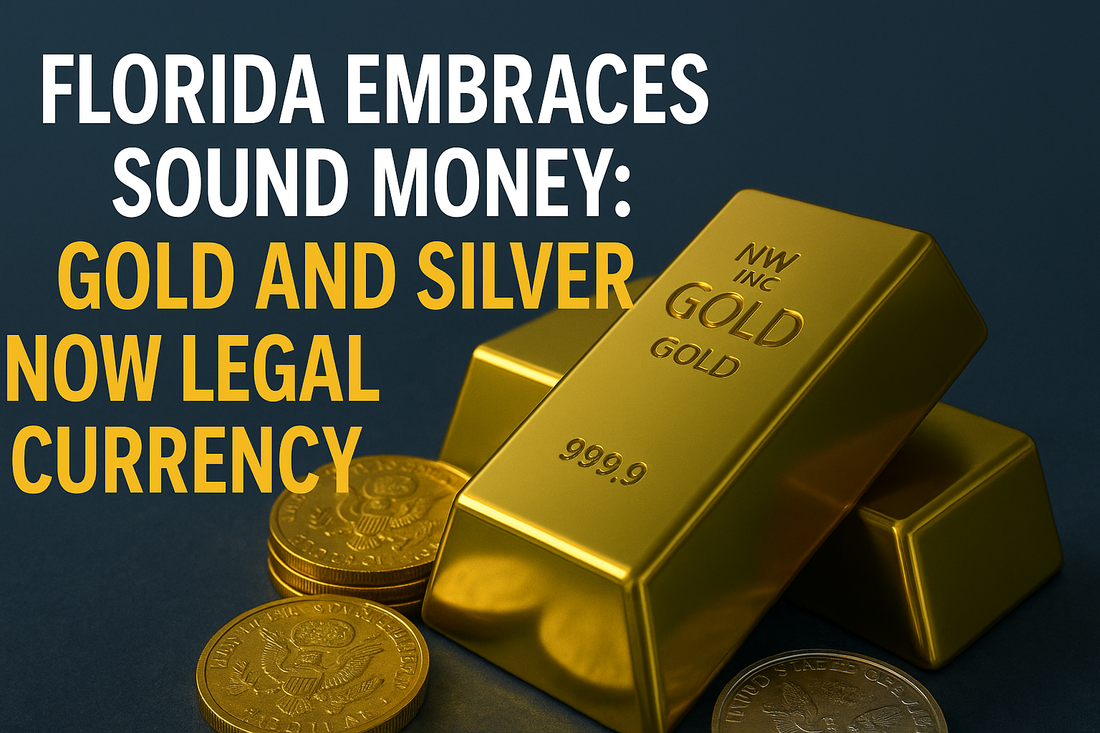
Florida Embraces Sound Money: Gold and Silver Now Legal Currency
Share
In a bold move that’s sending ripples across the nation, Florida Governor Ron DeSantis has signed a groundbreaking bill that allows gold and silver to be used as legal currency within the state. This monumental decision has sparked excitement among advocates of sound money and those seeking alternatives to inflation-prone fiat currency.
As economic uncertainty looms large and confidence in the U.S. dollar continues to erode, Florida’s action is a return to foundational monetary principles—backed not by politics or debt, but by tangible value.
What the New Law Means
On Tuesday, Governor DeSantis officially signed legislation that permits the use of certain forms of gold and silver as currency for commerce in Florida. The bill effectively allows individuals and businesses to conduct transactions using these precious metals, treating them not just as investments—but as money.
The law outlines guidelines for what qualifies as acceptable gold and silver: typically, coins and bullion recognized for their purity and authenticity. These transactions can now be carried out legally, giving Floridians more freedom to choose how they store and exchange their wealth.
Why This Matters in 2025
This bill couldn’t have come at a more crucial time. With inflation climbing and the cost of living outpacing wages, people are questioning the stability of the dollar. Federal debt is nearing unsustainable levels, and global discussions of "de-dollarization" are heating up.
By reintroducing gold and silver as currency options, Florida is offering a hedge—an alternative for those who want to escape the erosion of their purchasing power.
A Historical Throwback
Florida’s move is not without historical precedent. The U.S. Constitution, under Article I, Section 10, prohibits states from making anything but gold and silver coin a tender in payment of debts. For much of U.S. history, these metals were the backbone of the economy.
However, the 20th century saw a dramatic shift. The gold standard was officially abandoned in 1971, and since then, the U.S. dollar has operated purely as fiat money. This bill marks a symbolic and practical return to constitutional principles—reaffirming that money should hold intrinsic value.
Economic and Legal Implications
The implications of this bill stretch far beyond Florida:
-
Commerce: Businesses may begin accepting gold or silver as payment, potentially spurring a parallel economy.
-
Tax Benefits: Precious metals may now avoid certain capital gains taxes when used in transactions, pending further guidance.
-
Precedent Setting: Other states may watch closely—and follow suit.
On the legal front, the bill appears to align with constitutional principles. It also raises questions about states' rights in determining monetary policy at the state level, especially as trust in federal economic stewardship declines.
What This Means for You
If you’re a Florida resident, this opens up new opportunities:
-
Alternative Spending: You may use silver or gold in everyday transactions (where accepted).
-
Preserving Wealth: Holding precious metals offers a safeguard against inflation.
-
Private Trust & Estate Strategy: Trusts can now explore holding and exchanging wealth in hard assets more seamlessly.
For others across the U.S., this could signal the beginning of a new movement—one rooted in fiscal discipline and individual liberty.
A National Shift?
Florida is not alone in this shift. States like Texas and Utah have already made moves to recognize gold and silver in various financial frameworks. But Florida’s decision to directly legalize their use as currency marks one of the most assertive moves yet.
With increasing global tension, a weakening dollar, and growing interest in decentralization, this law may serve as a spark in a larger fire—one that redefines what money truly is in the 21st century.
Conclusion
Governor DeSantis’ signing of this bill isn’t just a political maneuver—it’s a powerful message. It says that real money is coming back. That the people deserve options. That gold and silver—true stores of value—can coexist with digital transactions and fiat systems.
Florida may be the first domino, but the real question is: Which state is next?
As the nation watches this monetary experiment unfold, one thing is clear—history may not repeat itself, but in Florida, it just might rhyme.
